Valentine’s Day Gift Guide for NYC Lovers
Find the perfect gift or date night idea to share with your Valentine in our New York City gift guide!


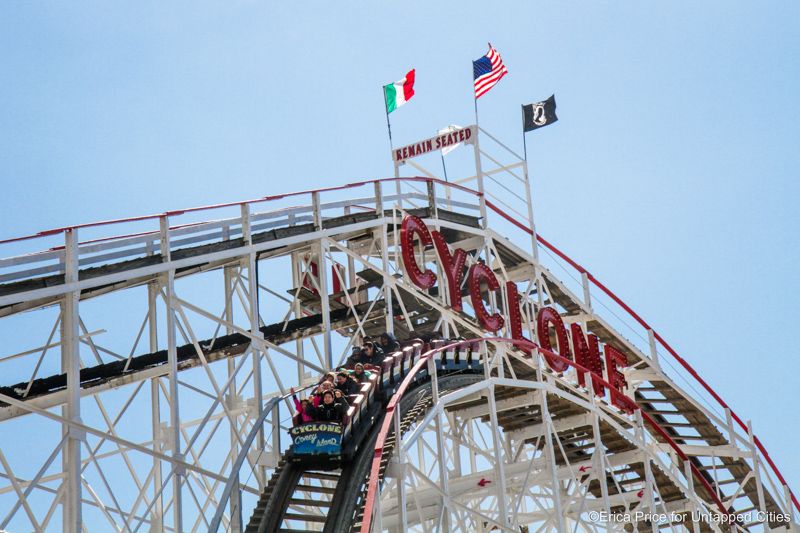
The Coney Island Cyclone will have been a staple of Luna Park for 90 years this coming Sunday, June 25, 2017, and according to Luna Park site, “she’s ready to celebrate.” The celebration for the cyclone starts at noon featuring not only the ride but also entertainment by Brooklyn hip hop artist, FABOLOUS!, music from Power 105’s, DJ Will, Angela Yee of The Breakfast Club and the Harlem Globetrotters.
Get a sneak peak here of what the Cyclone’s past holds with 10 of the secrets of the Coney Island Cyclone.
The below secrets provided by Untapped writer and tour guide Justin Rivers.
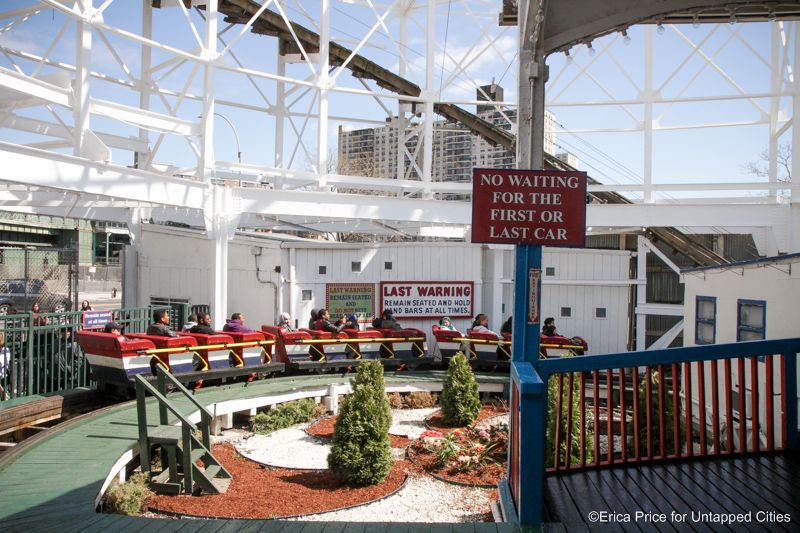
From the 2016 opening day of Luna Park.
Back in 1977, in honor of the Cyclone’s 50th Anniversary, a man named Richard Rodriguez set out to claim a world record. With 1,001 consecutive rides, Rodriguez rode the Cyclone for four days straight. For 30 years, this was the leading Guinness World Record for longest marathon coaster ride until it was broken by a man named Frank Rossler in 2006.
However, not to fear because in 2007, Rodriguez reclaimed the record that still stands today. Although he wouldn’t use the Cyclone to break the record this time, Rodriguez rode the Pepsi Max Big One and Big Dipper roller coasters at Pleasure Beach located in Blackpool, United Kingdom for 405 hours and 40 minutes– nine days and 12 hours.

Before Luna Park was the home of the Coney Island Cyclone, the ride existed under an amusement park of a different name: Astroland. A space-age style amusement park, Astroland originally opened in 1962, but closed (for the first time) in 1975 after a major fire took down the park.
As part of Astroland’s reopening celebration in the early ’80s, the Coney Island Cyclone was used to draw consumers back in by being set to run backwards. During that time the Cyclone was called “Back-Fire,” but would only ride in reverse during the weekdays.
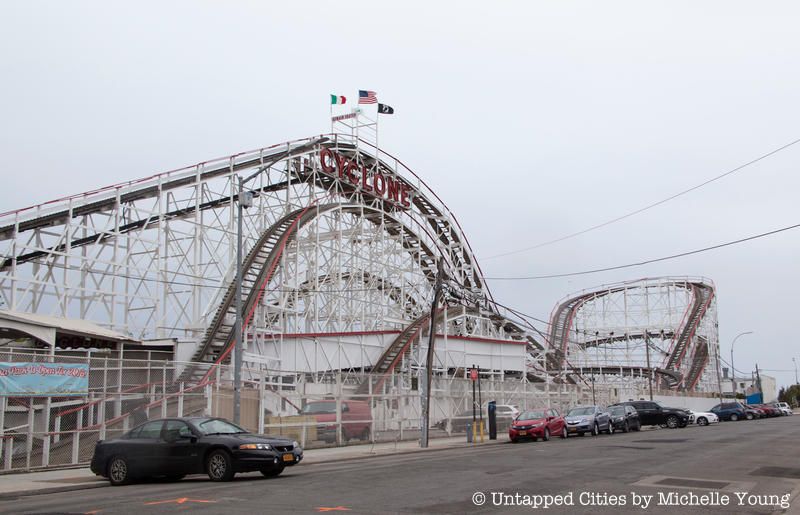
In the summer of 1988, the Coney Island Cyclone was up for consideration to become a historical landmark (which was subsequently approved). As part of the case for the Cyclone’s significance, a public hearing took place in which many anecdotes that were thought to show-off the Cyclone’s character were shared, including the opinion of Charles Lindbergh.
Lindbergh, who is credited as the first person to make a solo, nonstop flight across the Atlantic Ocean was quoted at the hearing as having said: “A ride on Cyclone is a greater thrill than flying an airplane at top speed.” Lindbergh was reported saying this just two years after he crossed the Atlantic.
Another fun fact: in the next state over, in Flemington, New Jersey is where the famous case to try the kidnapper of Lindbergh’s son tok place – a historic town at risk of demolition.
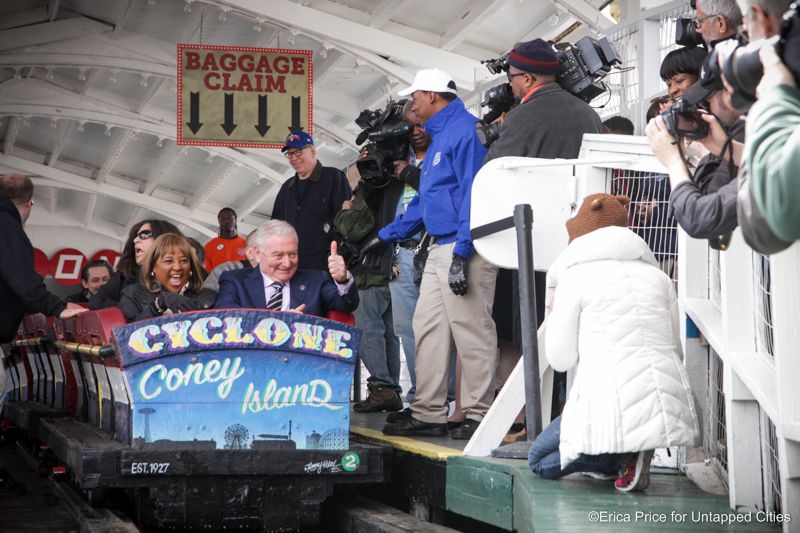
From the 2016 opening day of Luna Park.
In the same campaign to make make the Cyclone a historical landmark, it was clarified that the Cyclone technically falls under the category of “wood-twister gravity ride.” At the time of the public hearing in the ’80s, this type of coaster was already locked down as a dying breed.
Here’s what the Historical Preservation Commission’s analysis of the Cyclone laid out:
“Nationally, the Cylcone belongs to an increasingly rare group of wood-track coasters, there being only about eighty-five extant from the more than 1,500 that once thrilled America. The special qualities of wood are its natural resilience, the distinctive sound it makes, its unique aesthetic as a structural frame, and the relative ease of replacing parts. Today the Building Code of the City of New York prohibits the construction of timber-supported roller coasters; thus the Cyclone is irreplaceable.”
Join us for our tour of the Secrets of Coney Island on Saturday!
Tour the Secrets of Coney Island: Past, Present, Future, & Unknown
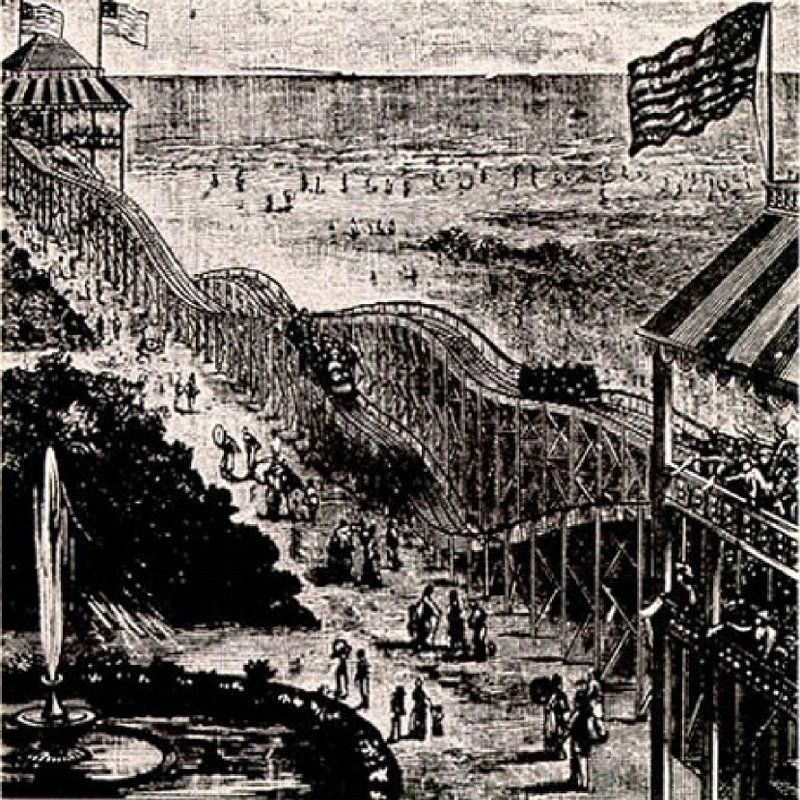
The original switchback railway in 1884. Image via Wikipedia.
Although the Cyclone has occupied the same spot since it was erected 90 years ago, a different roller coaster– in fact, America’s first rollercoaster– called the Switchback Coaster was on was on the Cyclone’s future plot. Built in 1884, The Switchback was inspired by a Mauch Chunk Switchback Railroad a coal mining train in Carbon County, Pennsylvania that started carrying recreational thrill seekers in the mid-1800s.
The Switchback was highly popular as it evident by it bringing in $600 a day and thereby paying for itself in just three weeks. However, despite its popularity, most believe the the Switchback Coaster only lasted a season or two.
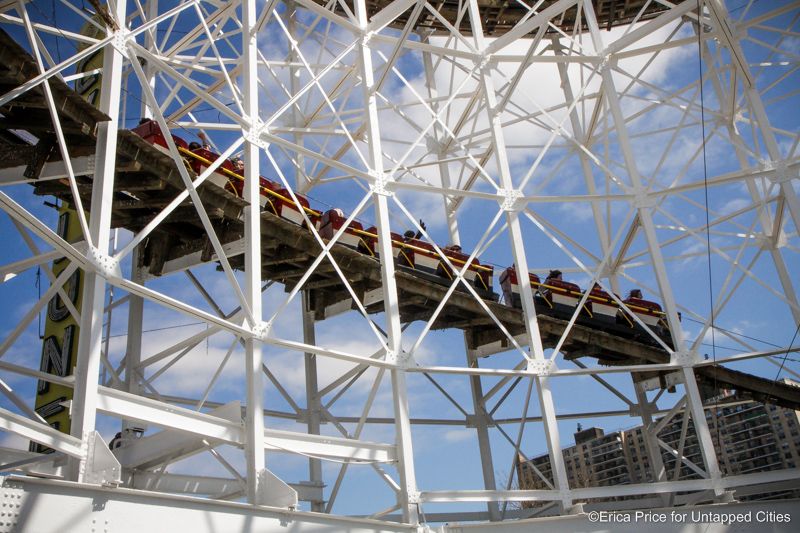
Over the course of the Cyclone’s 90 years, three people lost their lives due to fluke incidents.
The latest death caused by the Cyclone occurred in 2007– almost twenty years passing since someone had died due to the ride. The victim, Keith Shirasawa, was celebrating his fifty-third birthday when he was got on the Cyclone, rode the ride, and then exited with three crushed vertebrae in his neck. Shirasawa didn’t die instantly, but passed away a few days later due to complications from the surgery.
The first death occurred in 1985 when a 29-year-old man stood up just in time to get strike his head against a crossbeam. Then just three years later in 1988, a 26-year-old man fell to his death after crawling out from underneath his safety bar. Although the ride closed following the incident, it reportedly opened the very next day after being cleared by inspection.
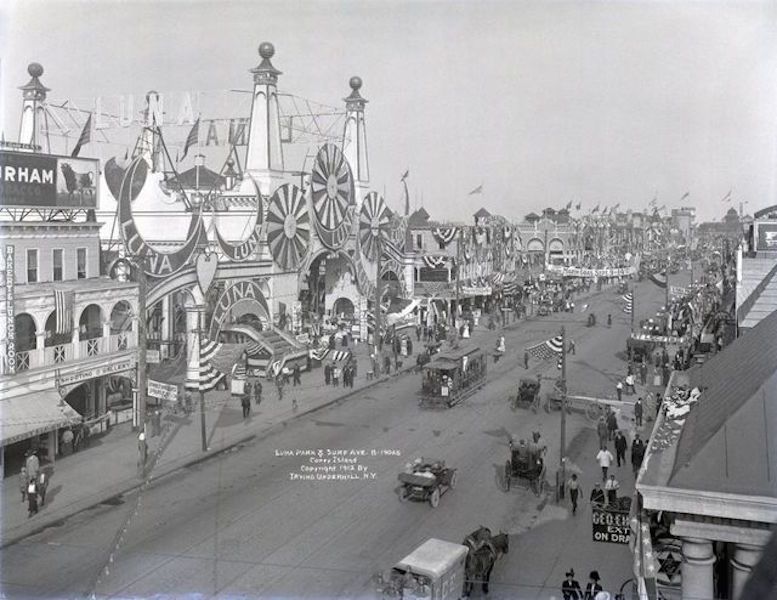
Luna Park and Surf Avenue in 1912. Image via Wikimedia Commons
The ancestry of the concept of the roller coaster has always had a long past as it winds all the way back to connections to 17th century Russian ice slides. However, it wasn’t until the 1920s that roller coasters and amusements really started to flourish. Of the hundreds of coasters that were built during the early twentieth century, only a handful still continue to run.
The oldest coaster, called Leap the Digs located at Lakemont Park in Altoona, Pennsylvania, was built in 1902 (though it only drops 9 feet and goes 10 miles per hour). Then coming in at number 12, is New York’s very own Coney Island Cyclone. The coasters in the no. 10 and no 9 spots were also built in 1927, edging out the Cyclone by just a handful of months.
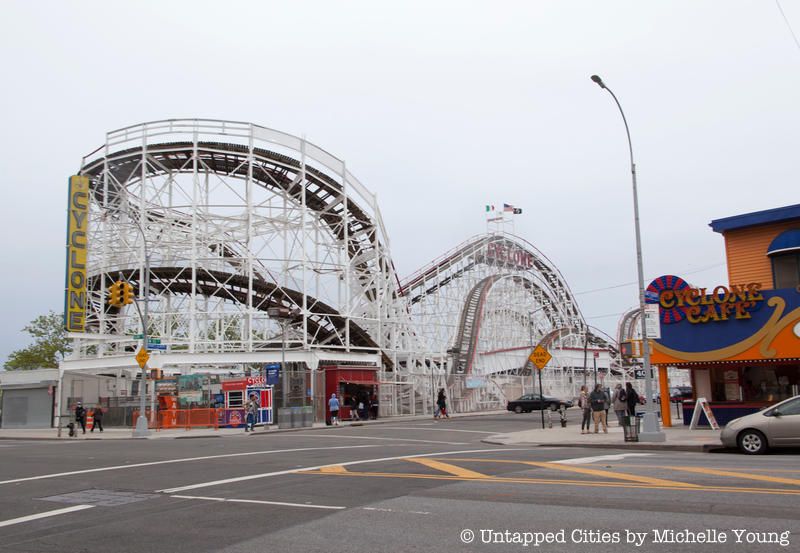
The first time the Cyclone was almost demolished was in 1971 when the city bought it from its then owner, Silvio Pinto, for $1 million. The plan at the time was to turn the site of the Cyclone over to the New York Aquarium for parking lot extension. However, the city backed out though all the while the Pintos were letting the ride fall into disrepair in anticipation of the demolition.
This disrepair lead to the second call for the Cyclone’s demolition, which was headed by the ride’s surrounding neighbors: the Luna Park houses, the Aquarium and the owner of Astroland Park. In the end, it was the owner of Astroland Park, Dewey Albert, who purchased the coaster and incorporated it into his park. It is now run by Zamperella, Luna Park which is its current next-door neighbor.
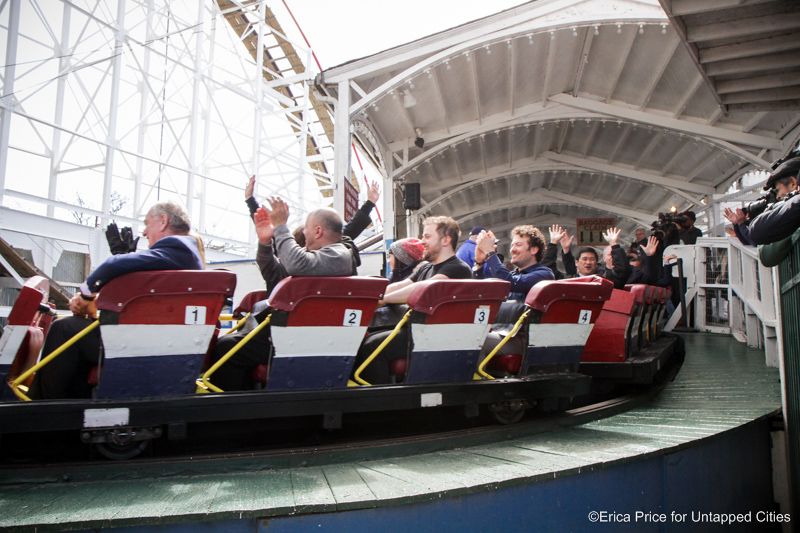
From the 2016 opening day of Luna Park.
Gerry Menditto initially took over running the Cyclone as a temp job in ’70s back when the ride was still apart of Astroland. What was meant as a simple two-week temp job turned into a career that lasted decades. In his time running the coaster, he’s seen several couples married before taking the famous 85-foot plunge and he even saw one man take his oath to reenlist in the Navy atop the ride.
However, for as much time and dedications as he’s spent in service of the Cyclone and the safety of its patrons, he’s never once taken a ride. As the Daily News reports, “I’m not afraid of the ride, because I hung from every piece of steel on this ride. I’ve been all over it,” Menditto says. “It’s not a question of the height or . . . the speed, I just don’t like the drop.”

In 1997, the Cyclone had its 70th Anniversary celebration. One event featured a women-only ride marathon with the the leader making it to 381 consecutive rides. Then two hired actors (ages 75 and 72) who were supposed to be married and divorced over the course of the ride ended up falling in love and skipped the divorce part.
However, probably the star of the celebration was when a man named Tino Wallenda walked a tightrope between the coaster’s two highest points. Along the way, he stopped to do a headstand.
Join us for our tour of the Secrets of Coney Island on Saturday!
Tour the Secrets of Coney Island: Past, Present, Future, & Unknown
To read more about thrill rides and unique nature of Coney Island check out 27 Secrets of NYC’s Coney Island or This Week in NYC History: America’s First Roller Coaster Opens on Coney Island. Get in touch with the author: @Erika_A_Stark
Subscribe to our newsletter